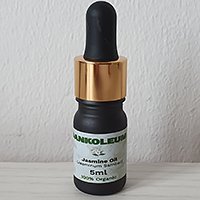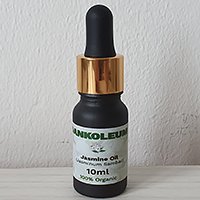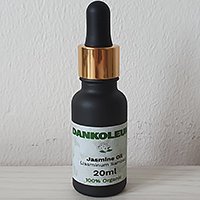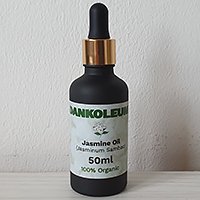
Jasmine Oil
Jasmine oil, sometimes called Jessamine or Jasminun officinale, uses a rather more complex extraction process than the rest of essential oils. It is a two-step based operation – firstly, the oil is extracted from the flower petals of the common jasmine plant using a solvent, and this is known as concrete. In the second step, a form of grain alcohol is added to the substance, which is then brought up to the high temperature, and then, when alcohol is evaporated, a dark orange liquid is produced known as an absolute.
The Jasmine plant is native to China, India, and the region known as Indochina, but is also cultivated in the Mediterranean countries. It is an evergreen shrub that can rise up to 10 meters high with delicate, bright green leaves and star-shaped, heavily scented flowers.
For centuries this aromatic oil has been popular for its fragrance and used in some of the most popular perfumes e.g. Chanel no. 5. It is also used in alcohol and confectionaries, but it also has many health benefits. In China, the flowers were used to treat hepatitis, liver cirrhosis, conjunctivitis, skin ulcer, and tumours. In the West, jasmine was used to facilitate births and respiratory illnesses. Some clinical trials showed that inhaling jasmine oil could have a calming effect on a person, while the other ones argue that jasmine’s romantic scent has an aphrodisiac effect.
Recent studies and analysis have been largely limited, but the aromatherapy supporters hail the Jasmine natural oil as a remedy against stress, blood pressure, anxiety, breathing difficulties, etc.
Although classified as non-toxic oil and non-irritant, it has been recorded that some individuals have had an allergic reaction to it.
In aromatherapy the oil is used in:
- Skin care: treatment of dry, greasy, and sensitive skin.
- Muscular issues: spasm, sprains.
- Respiratory problems: coughs, laryngitis.
- Genito-urinary issues: labour pains, uterine anomalies.
- Nervous systems problems: depression, stress, exhaustion, etc.
There are a number of ways of how Jasmine essential oil is to be used and they depend on how the oil has been dispensed. Oils in their natural form should be diluted, despite the general view that Jasmine is considered safe and non-irritant. Some ways of using jasmine oil:
- Inhaled from the bottle - In a diffuser - Mixed with another oil, called carrier oil
Our jasmine oil has a rich, floral scent and is obtained from the white flower of the Jasmine plant grown in India.



